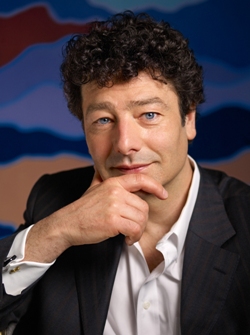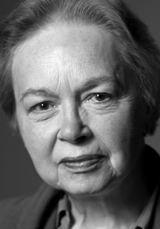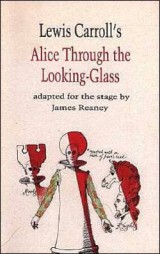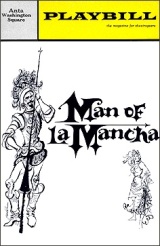Shakespeare rules the playbill as Stratford unveils plans for its 2014 summer festival
 Report: Musicals “Man of La Mancha” and “Crazy for You” among other shows on tap with four plays by the Bard, including director Peter Sellars’ chamber version of “A Midsummer Night’s Dream.”
Report: Musicals “Man of La Mancha” and “Crazy for You” among other shows on tap with four plays by the Bard, including director Peter Sellars’ chamber version of “A Midsummer Night’s Dream.”
By Lawrence B. Johnson
While the Stratford Festival has shed its branding association with the Bard of Avon, any concerns that the festival might really be loosening its traditional ties with Shakespeare should be allayed by newly announced plans for the summer of 2014. The Bard abounds.
 Under the season theme of “Madness: Minds Pushed to the Edge,” the Ontario festival will include, well, 4.5 Shakespeare plays: “King Lear,” “King John,” “Antony and Cleopatra” and “A Midsummer Night’s Dream” – the last in a form that should look familiar enough as well as an additional “chamber” version for just four players directed by one of the world’s most innovative masters of stagecraft, Peter Sellars.
Under the season theme of “Madness: Minds Pushed to the Edge,” the Ontario festival will include, well, 4.5 Shakespeare plays: “King Lear,” “King John,” “Antony and Cleopatra” and “A Midsummer Night’s Dream” – the last in a form that should look familiar enough as well as an additional “chamber” version for just four players directed by one of the world’s most innovative masters of stagecraft, Peter Sellars.
Also notable on the 2014 playbill are George Farquhar’s early 18th-century comedy “The Beaux’ Stratagem,” Noël Coward’s “Hay Fever” and Bertold Brecht’s “Mother Courage.” The lineup includes two musicals: “Man of La Mancha” and the Gershwins’ “Crazy for You.”
“These plays explore minds that are driven out of balance by a variety of forces: love, war, poverty, age, sexuality,” says Stratford artistic director Antoni Cimolino. “In today’s fast-paced global community, we are becoming ever more acutely aware of the consequences of such pressures.
“The issues behind them are interesting in themselves, but what they do to the human mind – to us – is ultimately the most fascinating thing. When the pressures of life become great enough, our minds give way to other realities. The result is often heartbreakingly tragic, but can also be a trigger for comedy.”
Production dates and casting are yet to be announced.
The 2014 Stratford Festival season in brief:
 “King Lear” by William Shakespeare, directed by Antoni Cimolino, at the Festival Theatre: When the aging King Lear decides to divide his kingdom among his three daughters, he requires each in turn to publicly profess how much she loves him. That vain command sets in motion a train of events that will rob him of his home, his status and his sanity – everything except the honest love and loyalty of his youngest daughter. “King Lear” speaks to the simple, naked humanity shared by everyone from a monarch to the poorest of the poor,” says Cimolino, who will direct the play. “It’s from that essential humanity, not the trappings of wealth or power, that we claim our right to exist. After Lear loses everything, he finds that he is no longer who he thought he was. This loss is a liberation. In his subsequent madness he sees his own folly, awakens to empathy and discovers his soul.”
“King Lear” by William Shakespeare, directed by Antoni Cimolino, at the Festival Theatre: When the aging King Lear decides to divide his kingdom among his three daughters, he requires each in turn to publicly profess how much she loves him. That vain command sets in motion a train of events that will rob him of his home, his status and his sanity – everything except the honest love and loyalty of his youngest daughter. “King Lear” speaks to the simple, naked humanity shared by everyone from a monarch to the poorest of the poor,” says Cimolino, who will direct the play. “It’s from that essential humanity, not the trappings of wealth or power, that we claim our right to exist. After Lear loses everything, he finds that he is no longer who he thought he was. This loss is a liberation. In his subsequent madness he sees his own folly, awakens to empathy and discovers his soul.” “A Midsummer Night’s Dream” by William Shakespeare. Full-scale production directed by Chris Abraham, artistic director of Crow’s Theatre in Toronto, at the Festival Theatre; chamber version with two pairs of actors playing all the characters, directed by Peter Sellars at the Studio Theatre: Love runs amok as Hermia flees to the woods with her lover, Lysander, to escape her father’s command that she marry Demetrius. Demetrius follows, pursued by Helena, whose love he spurns. Their romantic problems intensify when the fairy world intervenes. “‘A Midsummer Night’s Dream’ is ‘Romeo and Juliet’ with a happy ending,” says Cimolino. “This is the first time in our history to explore a text from two different points of view in the same season. “Chris Abraham is a brilliant director. Peter Sellars bring his own point of view – an X-ray of the play in which two couple speak all the lines, exposing the dynamics of love, sex and emotions.”
“A Midsummer Night’s Dream” by William Shakespeare. Full-scale production directed by Chris Abraham, artistic director of Crow’s Theatre in Toronto, at the Festival Theatre; chamber version with two pairs of actors playing all the characters, directed by Peter Sellars at the Studio Theatre: Love runs amok as Hermia flees to the woods with her lover, Lysander, to escape her father’s command that she marry Demetrius. Demetrius follows, pursued by Helena, whose love he spurns. Their romantic problems intensify when the fairy world intervenes. “‘A Midsummer Night’s Dream’ is ‘Romeo and Juliet’ with a happy ending,” says Cimolino. “This is the first time in our history to explore a text from two different points of view in the same season. “Chris Abraham is a brilliant director. Peter Sellars bring his own point of view – an X-ray of the play in which two couple speak all the lines, exposing the dynamics of love, sex and emotions.” “King John” by William Shakespeare, directed by Tim Carroll, former associate director of Shakespeare’s Globe in London, at the Tom Patterson Theatre: King John struggles to retain throne and authority as he fends off both French political interests and papal threats of excommunication. “‘King John’ looks at a mind driven by the dangerous combination of ambition and insecurity,” says Cimolino. “John commits horrible acts to secure a position he rightly holds. There is a wonderful range of characters in this play who navigate, with varying degrees of success, the pressures of politics, ambition, legitimacy and loss. It is the Bastard (a very different bastard from Edmund in ‘King Lear’) who comes through the play with the most honour and integrity.”
“King John” by William Shakespeare, directed by Tim Carroll, former associate director of Shakespeare’s Globe in London, at the Tom Patterson Theatre: King John struggles to retain throne and authority as he fends off both French political interests and papal threats of excommunication. “‘King John’ looks at a mind driven by the dangerous combination of ambition and insecurity,” says Cimolino. “John commits horrible acts to secure a position he rightly holds. There is a wonderful range of characters in this play who navigate, with varying degrees of success, the pressures of politics, ambition, legitimacy and loss. It is the Bastard (a very different bastard from Edmund in ‘King Lear’) who comes through the play with the most honour and integrity.” “Antony and Cleopatra” by William Shakespeare, directed by Gary Griffin, associate artistic director of Chicago Shakespeare Theatre, at the Tom Patterson Theatre: Even as he dallies in Alexandria with the beautiful Cleopatra, the Roman military general Mark Antony attempts to break free of her spell. When he returns to Rome to help suppress a rebellion, he also enters a political marriage, enraging Cleopatra. But when war breaks out, Antony flies to Cleopatra, a choice that leads to his own and Cleopatra’s tragic ends. “‘Antony and Cleopatra’ examines older love and the pressures of being madly in love when you know better,” says Cimolino. “This play has some of the most incredibly lyrical and intense love poetry ever written, along with beautiful observations on life that speak to us today.”
“Antony and Cleopatra” by William Shakespeare, directed by Gary Griffin, associate artistic director of Chicago Shakespeare Theatre, at the Tom Patterson Theatre: Even as he dallies in Alexandria with the beautiful Cleopatra, the Roman military general Mark Antony attempts to break free of her spell. When he returns to Rome to help suppress a rebellion, he also enters a political marriage, enraging Cleopatra. But when war breaks out, Antony flies to Cleopatra, a choice that leads to his own and Cleopatra’s tragic ends. “‘Antony and Cleopatra’ examines older love and the pressures of being madly in love when you know better,” says Cimolino. “This play has some of the most incredibly lyrical and intense love poetry ever written, along with beautiful observations on life that speak to us today.” “Hay Fever” by Noël Coward, directed by Alisa Palmer, former artistic director of Toronto’s Nightwood Theatre, at the Avon Theatre: Meet the Bliss family — a retired actress mother, novelist father and two children, all prone to their own outrageous eccentricities. The family’s self-absorbed antics astound and ultimately exasperate the various guests that each of them has invited to their country house for the weekend. “Theater is about taking ordinary situations and pushing them to the extreme – and what could be more delightful than experiencing this through the lives of a theater family?” says Cimolino. “These people pretend to have an interest in conventional living, in entertaining at their country property. But as we can see by the end, they really are in a world all their own. It’s as if they lived only on the stage.”
“Hay Fever” by Noël Coward, directed by Alisa Palmer, former artistic director of Toronto’s Nightwood Theatre, at the Avon Theatre: Meet the Bliss family — a retired actress mother, novelist father and two children, all prone to their own outrageous eccentricities. The family’s self-absorbed antics astound and ultimately exasperate the various guests that each of them has invited to their country house for the weekend. “Theater is about taking ordinary situations and pushing them to the extreme – and what could be more delightful than experiencing this through the lives of a theater family?” says Cimolino. “These people pretend to have an interest in conventional living, in entertaining at their country property. But as we can see by the end, they really are in a world all their own. It’s as if they lived only on the stage.”- “The Beaux’ Stratagem” by George Farquhar, directed by Cimolino at the Festival Theatre: Disguising their identities, two impoverished rakes arrive in the town of Lichfield seeking to restore their fortunes by wooing wealthy women. As the two connive to relieve ladies of their wealth, they must contend with a suspicious local innkeeper and his band of highwaymen, and with an acquaintance privy to their true identity. “The necessity of coping with the realities of marriage and personal finance give way to a romp,” says Cimolino. “This is one of the last of the Restoration comedies – something we haven’t done at Stratford in nearly 20 years. Farquhar wrote it when he was dying, in hope that the play would finance his family after his death. It is very funny.”
 “Mother Courage” by Bertolt Brecht, directed by Martha Henry, one of the festival’s most celebrated artists, at the Tom Patterson Theatre: Written in 1939 as a response to the Nazi invasion of Poland, but set in 17th-century Europe, the story follows Mother Courage as she struggles to make a living and to protect her three children during the Thirty Years’ War. By the end of the play, having lost everyone she loves and almost everything she owns, she has been driven to the edge. “This is one of the great plays of the 20th century,” says Cimolino, “and boy, is it ever timely. There’s a war somewhere all the time, and people to profit by it. Mother Courage loses everything but can’t get off the ride while there’s money to be made.”
“Mother Courage” by Bertolt Brecht, directed by Martha Henry, one of the festival’s most celebrated artists, at the Tom Patterson Theatre: Written in 1939 as a response to the Nazi invasion of Poland, but set in 17th-century Europe, the story follows Mother Courage as she struggles to make a living and to protect her three children during the Thirty Years’ War. By the end of the play, having lost everyone she loves and almost everything she owns, she has been driven to the edge. “This is one of the great plays of the 20th century,” says Cimolino, “and boy, is it ever timely. There’s a war somewhere all the time, and people to profit by it. Mother Courage loses everything but can’t get off the ride while there’s money to be made.”- “Christina, the Girl King” by Michel Marc Bouchard, directed by Vanessa Porteous, artist director of Alberta Theatre Projects, at the Studio Theatre: Commissioned by the festival as a translation in 2010, the play is the story of Christina of Sweden, a remarkably modern character who was born just 10 years after Shakespeare’s death. The enigmatic ruler showed a passion for philosophy, literature and the arts but her lifestyle and refusal to marry proved sources of great concern at court. Rather than bow to pressure to conform to expectations, the 26-year-old queen abdicates in order to be free to pursue her own aspirations. “Michel Marc Bouchard has beautifully brought to life the story of a historical figure who had the courage to step outside of the society that attempted to bind her in,” says Cimolino. “Christina introduced foreign, and then radical scientific and philosophical ideas. Bouchard examines the pressures inherent in her sexual and personal self-discovery in a highly compelling play.”
 “Alice Through the Looking-Glass,” adapted by James Reaney from Lewis Carroll, directed by Jillian Keiley, artistic director of English Theatre at the National Arts Centre (Ottawa), at the Avon Theatre: It’s Alice’s wonderful and beloved adventure. Deciding to explore the alternative world she sees inside her living-room mirror, Alice finds a place that in some aspects resembles her home yet differs from it in ways as delightful as they are surreal.
“Alice Through the Looking-Glass,” adapted by James Reaney from Lewis Carroll, directed by Jillian Keiley, artistic director of English Theatre at the National Arts Centre (Ottawa), at the Avon Theatre: It’s Alice’s wonderful and beloved adventure. Deciding to explore the alternative world she sees inside her living-room mirror, Alice finds a place that in some aspects resembles her home yet differs from it in ways as delightful as they are surreal.
“The underlying material for ‘Alice’ is iconic and examines a fantasy world filled with some of the greatest and most familiar nonsense verse,” says Cimolino. “The characters – the Walrus and the Carpenter, Tweedledum and Tweedledee, Humpty Dumpty and the Jabberwock – are the inhabitants of the farthest reaches of a child’s imagination.”- “Crazy for You” – music by George Gershwin, lyrics by Ira Gershwin. Directed by Donna Feore, at the Festival Theatre: Set in the 1930s, “Crazy for You” is the story of Bobby Child, the scion of a wealthy banking family, whose dream in life is to be a Broadway dancer. Sent by his mother to foreclose on a struggling theater, he faces a dilemma when he falls in love with a local girl whose affections he will lose if he carries out his mother’s commission. His solution: put on a show and pay off the theater’s mortgage. “The story is secondary to the powerful force of the Gershwins’ music,” says Cimolino. The show’s hit list includes “I Got Rhythm,” “They Can’t Take That Away from Me,” “Nice Work if You Can Get It,” “Embraceable You” and “Someone to Watch Over Me.”
 “Man of La Mancha – music by Mitch Leigh, lyrics by Joe Darion. Directed by Robert McQueen at the Avon Theatre: It is Miguel de Cervantes’ 17th-century tale of the mad Don Quixote and his obsessive quest to attain the impossible dream. “The source material is from the Spanish Golden Age, and you can see that period’s theatrical influence on Shakespeare in (his) Romance plays,” says Cimolino. (Cervantes was Shakespeare’s older contemporary.) “‘Man of La Mancha’ takes that source material and puts it through the lens of American musical theater. It depicts a pure, chaste, romantic and mature love – love that elevates the beloved.”
“Man of La Mancha – music by Mitch Leigh, lyrics by Joe Darion. Directed by Robert McQueen at the Avon Theatre: It is Miguel de Cervantes’ 17th-century tale of the mad Don Quixote and his obsessive quest to attain the impossible dream. “The source material is from the Spanish Golden Age, and you can see that period’s theatrical influence on Shakespeare in (his) Romance plays,” says Cimolino. (Cervantes was Shakespeare’s older contemporary.) “‘Man of La Mancha’ takes that source material and puts it through the lens of American musical theater. It depicts a pure, chaste, romantic and mature love – love that elevates the beloved.”
- Official website of the Stratford Festival: StratfordFestival.ca
- Director Tim Carroll on pronunciation in Shakespeare’s time: Watch the video here
- Director Peter Sellars talks Shakespeare: Read the interview here
- Playwright Tony Kushner ponders Bertolt Brecht’s “Mother Courage”: Read his essay here
Tags: "A Midsummer Night's Dream", Alice Through the Looking Glass, Alisa Palmer, Antoni Cimolino, Antony and Cleopatra, Bertolt Brecht, Chris Abraham, Christina the Girl King, Crazy for You, Gary Griffin, George Gershwin, Hay Fever, Ira Gershwin, James Reaney, Jillian Keiley, Joe Darion, King John, King Lear, Lewis Carroll, Man of La Mancha, Martha Henry, Michel Marc Bouchard, Miguel de Cervantes, Mitch Leigh, Mother Courage, Noel Coward, Peter Sellars, Robert McQueen, Stratford Festival, Tim Carroll, Vanessa Porteous, William Shakespeare

